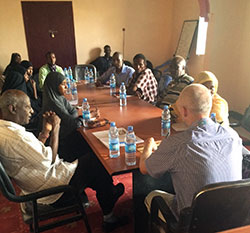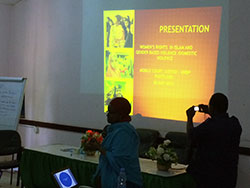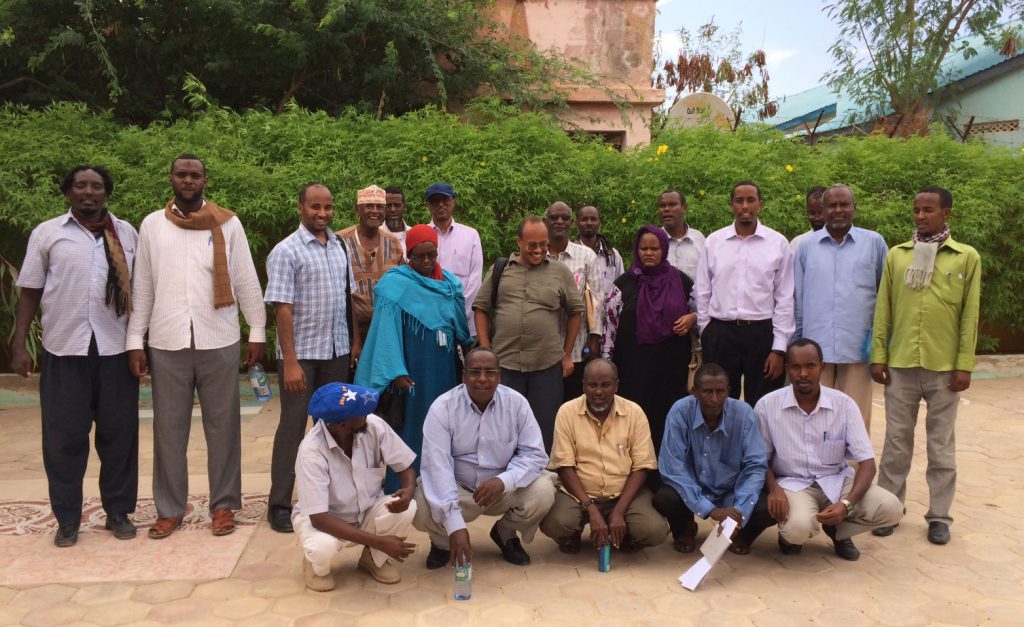For rising second-year law student Abadir Barre, spending the summer working for the Puntland Legal Aid Center (PLAC) in northern Somalia is more than a calling—it’s a homecoming.
Barre is from Somalia. In fact, his father was the minister of foreign affairs there, and his uncle, Siad Barre, was the president before he was overthrown at the start of the civil war in 1991. “As you can imagine, I was raised in a very patriotic household,” he says. “Growing up, I saw how my father and uncle served the Somali community, and it was admirable. So, my passion to do public service started at a young age.”
This summer, Barre has been assisting with informal and formal dispute resolution through the United Nations Development Programme (UNDP) Travelling Mobile Court, implemented in 2009 to give nomadic Somalis access to the judicial system, through the law school’s Global Public Interest Law Scholars in Africa summer internship program. He is among 21 other law students studying and working abroad this summer.
Barre is assisting the Travelling Mobile Court in its work to bring the rule of law to the war-torn country, as Somalis who had fled in the 1990s begin to return.

Along with participating in the Mobile Courts, PLAC mediates disputes between Somalis living in Internally Displaced Camps throughout Puntland. Barre has been working with PLAC’s paralegals in mediating cases for clients ranging from domestic disputes to employment issues. Barre uses both traditional dispute resolution methods as well as negotiation skills he’s gained from his legal education to successfully mediate disputes for his clients.
PLAC also provides free legal representation for Somalis living in Puntland’s major cities. Barre assists PLAC lawyers with client intake, carrying out investigations, and trial preparation. Barre has gained valuable experience working in Puntland’s court system by assisting PLAC’s litigation team with both criminal and civil cases.
“Now, with all the nation-building going on, everybody is coming back to their homes, even though it’s not stable yet. People are still trying to come back because they’re trying to re-create the stability they had before the Civil War,” Barre says. “I’m proud to be part of that effort.”
Barre says that the possibility of going back to Somalia to work as part of his legal education was a major draw when he was looking for law schools. “Washington University was on the top of the list, because they had the summer public interest program in Africa, they had a top program in NDR—negotiation and dispute resolution—and they had the Transnational Law Program, which lets you get an LLM abroad.”
However, the tipping point was when he visited the campus and met Karen Tokarz, the Charles Nagel Professor of Public Interest Law & Public Service and director of the Negotiation & Dispute Resolution Program, and affiliated faculty in African &African American Studies.

“I fell in love with Washington University because they received me so well,” he says. “The faculty, Career Services, the students, Admissions—it was a distinct culture. They wanted to know my story, my background, and then they told me how they could best serve me to reach my goals. Then when I spoke to Professor Tokarz, she understood the vision, she saw the goals, and in an instant we just connected. We knew we had a partnership.”
Tokarz told Barre that while the summer in Africa program has typically placed law interns in South Africa, Ghana, and Tanzania over the past 13 years, there was a possibility he could follow his dream and do his work in his home country. She mentioned a recent law student, Ilunga Kalala, JD ’13, with whom she had collaborated. With roots in the Democratic Republic of Congo, Kalala interned with Search for Common Ground, a dispute resolution organization in Kinshasha, where he assisted in dialogue facilitation and negotiations between civil society and the police.
“Professor Tokarz introduced me to Ilunga, who has become a great advisor for me as he shares my interest in helping our homelands—as well as my interest in international soccer,” he says.
To meet the summer public interest program’s weekly reporting requirements, Barre has been emailing his journals—or, on several occasions, speaking with Tokarz by phone. “While the Internet is often spotty, the cell phone service in Somalia is excellent,” he says. “We have been in touch throughout my internship.”
Though Barre realizes it may not be possible to customize the summer program for all students, he is grateful to Tokarz for her efforts to make it work out for him.
“The other schools I applied to had semester abroad or study abroad programs, but nobody had Somalia,” he says. “Washington University has given me the opportunity this summer to develop and use my negotiation and dispute resolution skills and put them to work in Somalia, because that is what’s most important there. I eventually want to work in a leadership capacity in Somalia at some point after I graduate. While I’m not sure whether it will be in the government or with the UN, I want to be giving back to my homeland. That is my goal.”
Timothy Fox
Summer 2014


